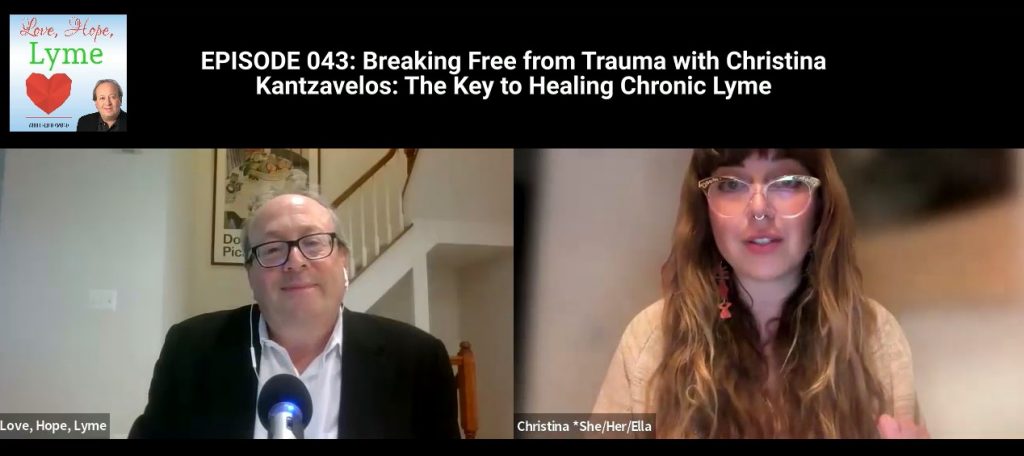PODCAST: Bridging chronic Lyme trauma and emotional healing

By Fred Diamond
Living with chronic Lyme disease can be a relentless battle, often misunderstood by those who haven’t experienced its toll. Beyond the physical symptoms lies an equally challenging realm: the mental and emotional effects of the disease.
On this week’s Love, Hope, Lyme podcast, Christina Kantzavelos, a therapist and chronic Lyme survivor, offers insights and hope for those navigating this complex journey.
Christina shares her professional expertise and personal experiences with Lyme disease, shedding light on the importance of addressing trauma, finding the right support, and embracing holistic healing practices.
The Mental Weight of Chronic Lyme Disease
Christina emphasizes the importance of working with a professional therapist who really “gets it.”
She explains, “It’s hard for someone to truly understand the symptoms of what we go through. When I used to see therapists who weren’t Lyme-literate, a good portion of the session was spent explaining my symptoms. But when you talk to someone who understands, you can dive straight into the heart of the matter.”
This understanding goes beyond mere knowledge; it provides a foundation of trust and compassion. Christina highlights the relief her clients express when they realize she accommodates the unpredictable nature of chronic illness, such as not charging cancellation fees for last-minute rescheduling due to health issues.
Trauma and Chronic Illness: Breaking the Cycle
A recurring theme in her work is the deep connection between trauma and chronic illness. Christina described how many people with Lyme are stuck in a “fight, flight, or freeze” state, a chronic stress response that impedes healing.
“When you’re in a survival response chronically, healing goes on the back burner. Your brain is just trying to get you from point A to point B; it doesn’t care about your immune system or happiness,” she said.
Her approach starts with nervous system regulation. She recommends neural retraining programs to help the brain recognize safety and shift into a healing mode. “If I could go back in time,” she said, “the first thing I would do is neural retraining.”
In a powerful moment, Christina addresses the common longing among Lyme survivors to “return to their old selves.” She offers a reframing of this perspective.
“The person who got you sick is not who you want to return to. You’re becoming the person who’s going to get you healthy and keep you healthy. I’ve become stronger in many ways because of this journey.”
Christina shares her transformation from being couch-bound to hiking and enjoying the activities she loves. This growth, she notes, comes from embracing what she calls “post-traumatic growth”—emerging from the other side of the healing journey as a transformed individual.
Practical Tools for Healing
Christina outlines several holistic and evidence-based practices she incorporates into her work:
- EMDR Therapy
Eye Movement Desensitization and Reprocessing (EMDR) helps individuals process and desensitize traumatic memories. Christina explains, “EMDR moves things from the left to the right hemispheres of the brain, helping you view trauma more objectively. But it’s essential to regulate your nervous system first, or it can dysregulate you further.”
- Constructed Awareness
This trauma-informed modality allows clients to address deep-seated beliefs and emotional patterns. Christina describes it as a gentle yet effective method for fostering healing and awareness.
- Mindfulness Techniques
She says that simple practices like deep breathing can immediately calm the nervous system. “Take deep breaths in through your nose, hold at the top, and ensure your exhale is longer than your inhale. This activates your parasympathetic nervous system and promotes rest and repair.”
She also recommends tapping (Emotional Freedom Technique), healing music, and meditations, many of which she provides as free resources on her website.
Relationships and Chronic Illness
The strain chronic Lyme disease places on relationships is profound. Christina acknowledges the challenges but highlights the importance of communication and support.
“This journey requires a community effort. Couples therapy, individual therapy, and support groups are vital. It’s also essential for the partner who isn’t sick to seek support and respite care when needed.”
She also points out that Lyme disease often amplifies preexisting relationship dynamics, revealing whether a partnership is sustainable. While some couples grow stronger, others may choose to “consciously uncouple.”
The Hope of Healing
Throughout her work, Christina emphasizes that healing is possible. She urges everyone to seek out the resources and practitioners who support their journey.
“I believe in your body’s capability to heal itself. I witness it every single day. There are people advocating for you and cheering for your recovery. You can get to the other side of this.”
Chronic Lyme disease is a multifaceted challenge, but as Christina Kantzavelos demonstrates, hope, community, and the right tools can pave the way toward healing. Her journey from trauma to triumph serves as a beacon for others navigating similar struggles.
Click here to listen to all episodes of the Love, Hope, Lyme Podcast or on YouTube.
Click here to learn more about Christina Kantzavelos and her work.
Fred Diamond is based in Fairfax, Virginia and can be contacted via Facebook. His popular book, “Love, Hope, Lyme: What Family Members, Partners, and Friends Who Love a Chronic Lyme Survivor Need to Know” is available on Amazon. The e-version of the book is always free to Lyme survivors. PM Fred on Facebook or LinkedIn for your copy.





















We invite you to comment on our Facebook page.
Visit LymeDisease.org Facebook Page